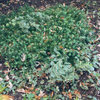Langeveld - legit trilliums?
susanargus
18 years ago
More Discussions
What do you think - are these safe to buy? I saw them in my local (non-chain) garden store. I'm so paranoid about trillium at this point!
http://www.langeveld.com/index.cfm?fuseaction=plants.plantDetail&plant_id=186
"Trillium erectum / Red Trillium / Perennials
This native woodland plant gives you wooded area some beautiful color early in the spring.
Interesting Notes
All plants grown from cultivated stock ( no plants are harvested from the wild)"

waplummer
kwoods
Related Professionals
Surprise Landscape Architects & Landscape Designers · Lakeland Landscape Contractors · El Mirage Landscape Contractors · El Segundo Landscape Contractors · Peoria Landscape Contractors · Pleasant Grove Landscape Contractors · Streamwood Landscape Contractors · Anaheim Fence Contractors · Burbank Fence Contractors · Leander Fence Contractors · San Fernando Fence Contractors · San Pedro Fence Contractors · Baltimore Siding & Exteriors · Framingham Siding & Exteriors · Western Springs Siding & Exteriorssam_md
ahughes798
elkima_mindspring_com
razorback33